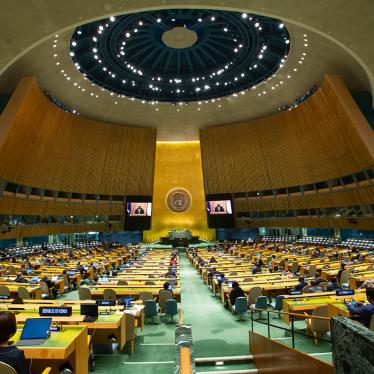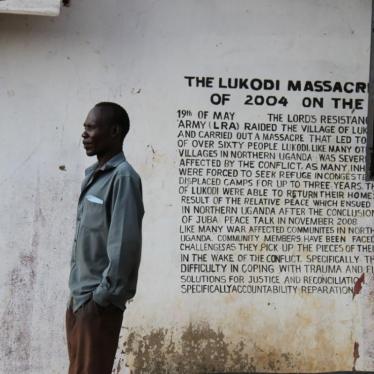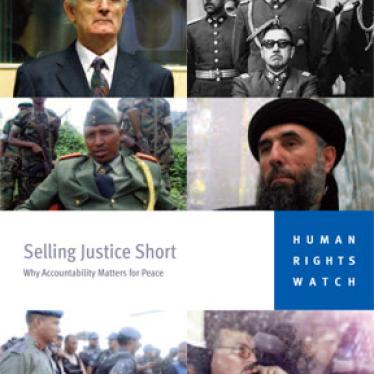Proposed Mandate
An EUSR for International Humanitarian Law and International Justice should be mandated to:
- Propose specific EU and member state actions to advance protection of civilians through respect for IHL and justice for international crimes, particularly in response to urgent crisis situations. This should include developing expertise on the range of justice options, for example, the ICC, other international tribunals and internationalized courts, fact-finding missions, commissions of inquiry, and dedicated investigative mechanisms. This should also include national-level atrocity crime trials, and ensuring that appropriate mechanisms are supported politically, financially, and at an operational level by the EU and other international partners;
- Advance respect for IHL worldwide and implementation of the EU guidelines and action plan on IHL. This should include recommending measures to raise the cost for those committing atrocity crimes and addressing the lack of accountability for IHL violations, such as attacks on healthcare facilities and personnel. The EUSR should also promote the protection of schools including by restricting their use for military purposes;
- Promote implementation and compliance of key humanitarian disarmament instruments such as the 2008 Convention on Cluster Munitions, 1997 Mine Ban Treaty, 1993 Chemical Weapons Convention, and 1980 Convention on Conventional Weapons. The EUSR should support the creation of new international law to prevent the development and use of fully autonomous weapons;
- Advance and contribute to the implementation of the EU’s decision and action plan on the ICC. This should include maintaining contacts with the ICC, promoting cooperation with the court, notably with regards to pending arrest warrants; steering an EU early warning mechanism to avoid non-cooperation with the court and ensure the EU’s reaction when it occurs; strengthening the EU’s diplomatic support to the ICC with regards to ongoing investigations; and promoting universal ratification and implementation of the Rome Statute;
- Mainstream EU support to national-level efforts through application of the complementarity principle, both as a matter of policy and in specific country situations;
- Help to ensure internal and external coherence and coordination in EU policies addressed to advance respect for international law and fighting impunity for atrocity crimes; and
- Forge coalitions with a range of other like-minded actors working collaboratively and innovatively, including other regional and international organizations, states, justice mechanisms, experts, victims, and civil society organizations.
Reporting to both the EU High Representative and EU member states will help maximize coordination of policies and actions, including with other special representatives; increase the representational value and legitimacy of the EUSR; and invest ownership in the development of policy steps equally with the EU institutions and member states.
What value would this position add to the EU’s existing support for international humanitarian law and international justice?
- Expert leadership. The EUSR would provide expert leadership concerning implementation of existing EU decisions and policies concerning IHL and international justice, as well as urgently-needed expert guidance for recommended EU actions and policies when dealing with situations of persistent IHL violations and persistent impunity for the most serious crimes of international concern.
- Visibility. The EUSR would be an important “face and voice” of EU support and the promotion of justice for international crimes across situations. The EUSR could catalyze diplomacy by various EU institutions and EU member states for maximum effect. Mandated by the European External Action Service (EEAS) and EU member states, the EUSR could demonstrate EU unity in matters related to the ICC and other international justice mechanisms, and add additional weight to the EU’s voice and actions.
- Coordination. The EUSR would also be a high-level voice internally at the EEAS, who could ensure that support for IHL, the ICC, and other accountability mechanisms is appropriately mainstreamed in all relevant areas of EU foreign policy. This would also serve to ensure smooth coordination between the EEAS, the European Commission, other EU institutions, ESDP missions, and EU member states in the areas of IHL and international justice.
- Innovation and consistency. The EUSR should bring and concentrate expertise on matters related to IHL, the ICC, and accountability for grave crimes with a view to influencing EU policy in a positive, proactive manner. This expertise should be across the board of various international justice initiatives and would enable the EUSR to draw lessons learned and inform EU policy. The EUSR would be the “keeper” of the EU’s agreed policies on IHL and the ICC and accountability for grave international crimes, to ensure consistent implementation. Working with a small expert team, the EUSR would also ensure that the EEAS has the necessary staff resources allocated to this important work. This is particularly important given the scale of IHL challenges around the world and the range of international justice mechanisms relevant to an increased commission of international crimes.
- Knowledge resource. The EUSR would collect information relevant to IHL developments and the operation of the ICC and other justice or related mechanisms (e.g., commissions of inquiry and fact-finding missions) for the promotion of accountability globally. This information would then be shared with the relevant EU working groups in Brussels and could inform EU policy to advance the work of the ICC and justice.
- External coordination and partnership. The EUSR would work within a network of partnerships across governments, regional organizations, the UN, the ICRC, and civil society. In this regard, the EUSR would be the counterpart of other existing IHL and international justice envoys including relevant regional and UN mechanisms.
Signatories:
Coalition for the International Criminal Court
FIDH
Human Rights Watch
No Peace Without Justice
Open Society Justice Initiative
Women's Initiatives for Gender Justice
World Federalist Movement - Institute for Global Policy
[1] This includes support for the International Criminal Court and other international mechanisms, assistance to national courts in third countries, and the use of universal jurisdiction and other forms of extraterritorial jurisdiction in the domestic courts of EU member states. Deterring and repressing international crimes also forms part of the European Union’s commitment to integrated approaches to external conflicts and crises, and is essential to peacebuilding and other efforts to achieve sustainable development. The EU has dedicated guidelines relevant to the deterrence and repression of international crimes committed against particularly vulnerable populations, guidelines on children and armed conflict, and guidelines on violence against women and girls and combating all forms of discrimination against them. Above all, these commitments reflect the European Union’s core commitment to the rule of law as an alternative to the use of violence. See, for example, “Council Decision of 13 June 2002 setting up a European network of contact points in respect of persons responsible for genocide, crimes against humanity and war crimes,” Council of the European Union, 2002/494/JHA, June 13, 2002; “EU Guidelines on Children and Armed Conflict,” December 9, 2003; “EU guidelines on violence against women and girls and combating all forms of discrimination against them,” December 8, 2008; “Updated European Union Guidelines on promoting compliance with international humanitarian law (IHL),” 2009/C 303/06, December 15, 2009; “Council Decision 2011/168/CFSP of 21 March 2011 on the International Criminal Court and repealing Common Position 2003/444/CFSP,” March 22, 2011; “Action Plan to follow-up on the Decision on the International Criminal Court,” Council of the European Union, July 12, 2011; “Joint Staff Working Document on Advancing the Principle of Complementarity: Toolkit for Bridging the gap between international & national justice,” Council of the European Union, February 22, 2013; “The EU’s Policy Framework on support to transitional justice,” Council of the European Union, November 15, 2015; “Council Conclusions on the Integrated Approach to External Conflicts and Crises,” January 22, 2018.









